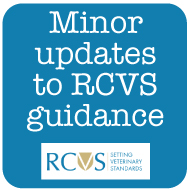RCVS updates COVID-19 guidance for veterinary professionals

The updated flowchart reflects the developing situation and latest guidance from the UK government.
The RCVS has updated its COVID-19 guidance for veterinary professionals to show how veterinary work may continue during the extended lockdown period.
The updated guidance, as agreed by College's COVID-19 Taskforce, has been designed to reflect the developing situation and latest guidance from the UK government and devolved nations. It comes in the form of a new flowchart, with two minor amends to the first and second boxes:
The box that previously said: ‘Can you effectively support the case while maintaining social distancing for your team and the public?’
Now says:‘Can you effectively support the case while abiding by the appropriate social/physical distancing guidance for workplaces to protect your team and the public?’
The RCVS says that this updated text better reflects the varying guidance in place across the devolved nations. It also recognises that the new government guidance is not just about maintaining a 2m distance, accepting that other biosecurity measures might be appropriate if the 2m rule cannot be followed in the workplace.
Second, the box that previously said: 'Could the planned intervention have animal health and welfare or public health implications if not carried out within two months?’
Now says: ‘Could the planned intervention have animal health and welfare or public health implications if not carried out?’
This change recognises that this phase of lockdown-exit may carry on for longer than two months, the RCVS notes. It, therefore, leaves it to the clinician’s professional judgement in terms of the implications versus the risk, rather than seeing it within a specific time period.
Commenting on the update, RCVS president Niall Connell, said: “I’m grateful to the members of our Covid-19 Taskforce for continuing to keep under review our key guidance to the profession during the ongoing pandemic.
"Whilst these latest changes do not represent any significant changes for vets and vet nurses as they continue to care for the nation’s animals, it is important that we continually keep our guidance in line with that of the UK’s governments.”



 The Veterinary Medicines Directorate (VMD) is inviting applications from veterinary students to attend a one-week extramural studies (EMS) placement in July 2026.
The Veterinary Medicines Directorate (VMD) is inviting applications from veterinary students to attend a one-week extramural studies (EMS) placement in July 2026.